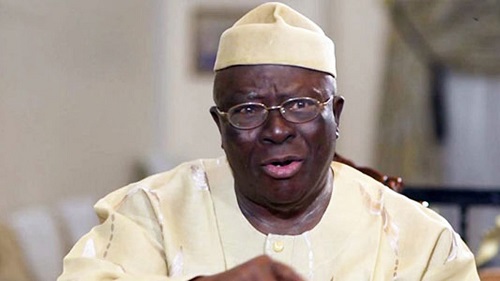
Afenifere, the apex socio-cultural organization of the Yoruba people and one time dominant and hegemonic political force, has found itself in the biggest quandary of its storied life. The current crisis threatens its existence in such a direct and lethal manner that it makes the earlier combustions to pale into utter insignificance.
No, no !! This is not a political obituary of Afenifere. One retains too much affection and reverence for the surviving titans of the organization to be caught conducting a coroner’s inquest into the political translation of such luminaries of the struggle. It may well be due to cultural conditioning. Actually, one had wanted to steer clear of the Afenifere controversy out of the fear of further inflaming passions.
But in the past three weeks or so, several compatriots and friends who believe that one knows much more than he is letting on have been asking for clarification and possible illumination on the issue. A younger associate and a titled Egba chief, after reading a recent column by this writer, actually went as far as accusing one of fiddling like Nero while the Yoruba nation burns.
Let us get this out of the way. It is up to the revered Afenifere grandees to determine whether as a group, Afenifere still has the capacity to offer a visionary pathway for the Yoruba race in the turbulent world of Nigeria’s postcolonial politics and whether it still retains the residual strength to mediate intra-elite competition and deal with the sub-ethnic sensitivities of a turbulent race in which sub-ethnic identities sometimes overshadow organic ethnic character.
These were the foundational problems that Obafemi Awolowo grappled with and he rode them out brilliantly until something had to give. But Awo returned to pick up the pieces. Whatever their answers to these posers, yours sincerely and the entire Yoruba race owe a lot to those grand old men. They stood by their people in the gravest hour of peril in the hands of the Nigerian postcolonial state.
It will be foolish and churlish whatever the extant political disagreement about strategy and modus operandi, to start speculating about the political demise of these brave and heroic old men in public. In Yoruba political culture, there is a protocol and procedure for the retirement of elders. There is something particularly nasty and unedifying about younger men openly defiling and defaming the reputation of older heroes simply because of politics.
Finding the golden mean among a combustible people and the most civil procedure for conducting political disagreement have their grave political perils and moments of acute mental agony. The following personal example is for the sake of illumination.
In 1998 shortly after his release from jail, the former Nigerian leader, Olusegun Obasanjo, journeyed to London to honour some pressing international engagements. One had been invited from Birmingham as part of his entourage.
At a civic reception for him later, Obasanjo was confronted by an irate crowd who openly accused him of already hobnobbing with the enemies of the Yoruba race. Most vociferous and militant was a young Yoruba activist who darkly warned the retired general of the dire consequences of betraying his people this time around.
Obasanjo was so livid and affronted by the young man’s temerity that he threatened to terminate proceeding. A retired Ghanaian colonel started pacing up and down the hall threatening to shoot everybody at sight if that was the way Nigerians treat African heroes. He could not understand how an Obasanjo who is treated like a deity in many African countries could be the object of such curt discourtesy among his own compatriots.
A tense silence ensued with the retired general insisting that before proceedings could resume, the young man must perform the ritual of traditional obeisance to him and the Yoruba activist rejecting the idea out of hand. Yours sincerely had to deploy all his leverage as an intellectual and activist to get the chap to relent. Thereafter, the interactive session proceeded on an even keel.
A few weeks after this incident, yours sincerely and his friend, Dr Biyi Oyefule, arrived at the tail-end of a NADECO meeting in New York presided over by Chief Anthony Enahoro with Pa Abraham Adesanya in attendance all the way from Nigeria. One had hardly sat down when one of the leaders in attendance pounced, accusing one of being Obasanjo’s campaign manager.
When he was asked the basis for this unfortunate allegation, he had informed the audience that he was told I was the one who ordered the fellow who was rude to the retired general to comply. In swift response, yours sincerely had responded that as a Yoruba person from a good home, one would have acted in likewise manner if he (the NADECO chieftain) was the subject of such public contretemps.
Both General Alani Akinrinade and Senator Bola Ahmed Tinubu leapt to one’s defence. General Akinrinade observed that the allegation was incompatible with one’s recent journalistic and political exploits. In the case of the soon to be Lagos State Governor-elect, Bola Ahmed Tinubu, he had added the personal touch that we were both lying on adjacent sofas in his London house before one got up to answer General Obasanjo’s invitation.
But the greatest political irony of the unfortunate flare up was lost on the NADECO notable of Yoruba extraction and since he is still alive, one will be revealing it for the first time on this page. Unknown to him, two days earlier somewhere in Brixton in South London one was almost roughed up by some implacable Obasanjo partisans for stoutly defending the selfsame NADECO chieftain over the allegation that he was the one who sent OPC stalwarts to disrupt the retired general’s interactive engagement.
END

Be the first to comment